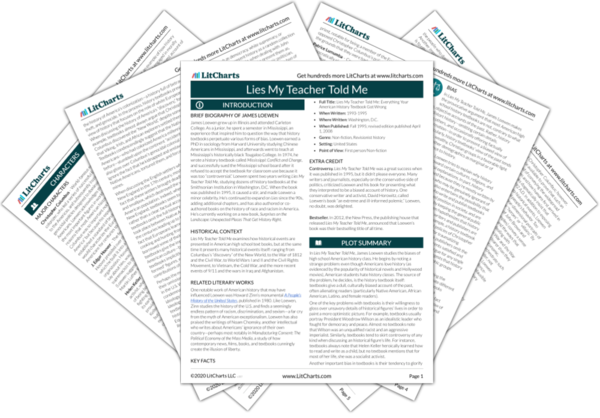Bias
In Lies My Teacher Told Me, James Loewen makes the provocative argument that most American high school history textbooks are not, contrary to what they claim, objective accounts of the past. Rather, history textbooks distort history—omitting certain details, exaggerating others, and occasionally offering factually incorrect information—in order to present a biased view of history. In particularly, history textbooks’ view of the past tends to present white, wealthy, Christian groups in a favorable light while…
read analysis of BiasAmbiguity
Perhaps the single biggest criticism that Loewen makes of high school history textbooks is that they present the past as a series of clear, non-negotiable facts. Yet history, Loewen argues, isn’t about memorizing lists of dates and names; it’s about understanding the debate and controversy that go into interpreting the past. In a word, history textbooks leave out a concept that should accompany any discussion of the past: ambiguity.
Throughout Lies My Teacher Told Me…
read analysis of AmbiguityThe Power of the Individual
James Loewen criticizes history textbooks for subtly implying that ordinary, individual people have almost no control over history. As textbooks describe it, history is just “one thing after another”—a series of random events, which often lack clearly defined causes. When textbooks do explore the causes of historical events, these causes are usually either the actions of an implausibly heroic historical figure or the magnanimity of a benevolent government. By presenting history in this way, textbooks…
read analysis of The Power of the Individual
Textbook Production
The bulk of Lies My Teacher Told Me examines the biases in contemporary textbooks’ accounts of American history. However, some of the book is also about the ins and outs of the textbook industry. In order to understand why history textbooks are so naïve and uninteresting, Loewen looks at the financial incentives of major publishing houses, coming to the conclusion that, in no small part, textbooks are bad because publishing houses are businesses that need…
read analysis of Textbook ProductionThe Role of Ideas in History
As Loewen sees it, one of the most striking problems with history textbooks is that they largely exclude ideas. They present history as an endless series of events, figures, and dates, but give no sense for the religions, philosophies, and cultural trends that often motivate people’s behavior. Loewen argues that it is critical that students of history have some sense for the role of ideas, for a number of reasons. First, ideas exert a profound…
read analysis of The Role of Ideas in History






